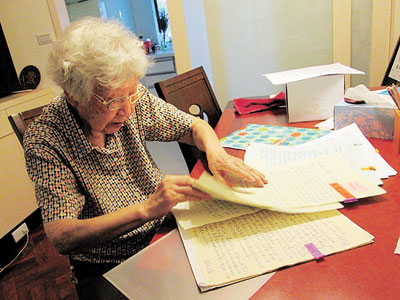
Authors in Taiwan and on the mainland wrote critiques and comments about the book. Media also invited Chi for interviews. As Chi chose to answer their questions carefully in written letters, gradually, she collected hundreds of letters concerning issues with the book. She then had the idea of offering a synthesized answer in the form of a new book.
THE book “Meeting at Great Flowing River,” which is seen as a sort of sequel to “Great Flowing River” by well-known Taiwanese editor and author Chi Pang-yuan, has recently been released in Taiwan.
The book was published by Chi’s students, and collects Chi’s letters, writings from overseas critics and media interviews concerning the “Great Flowing River.”
The press conference of the release was held Feb. 14, Chi’s 90th birthday, in Taipei. Well-known Taiwanese authors including Lung Ying-tai and Pai Hsien-yung attended the conference.
Born in 1924 in Liaoning Province, Chi is a well-known Taiwanese author, editor and literary scholar specializing in Chinese, English and American literature. Being called the “mother of Taiwanese literature” by many scholars, Chi has devoted herself to literary education in Taiwan and globally promoting Taiwanese literature throughout her career.
Chi started to write “Great Flowing River” at the age of 81. The autobiography, published in 2009 in Taiwan and 2010 on the mainland, tells the story of her and her family struggling in the context of the Republic of China period.
Located in northeastern China, the Juliu River (Great Flowing River) is one of the seven largest rivers in China and is called the “mother river that breeds Liaoning Province.” Due to the complicated political environment of early 20th century China, the family had to travel across the country to seek a stable life.
Born in the Juliu River area, Chi told the story of her life journey from the river to southern Taiwan. The special experience has also helped her form a devoted and strong character.
As a witness to that period of Chinese history, Chi recorded the major events across the country from the perspective of a female scholar. She also recorded many well-known figures in history, such as air force hero Zhang Dafei, professor Wu Mi and philosopher Xian Mu, showcasing different sides of these people from her own point of view.
The book soon gained huge attention among readers, scholars and critics across the straits, and was once sold out due to its increasing popularity. More than 100,000 copies have been sold in Taiwan alone. Chi also became well-known to mainland readers after it was published on the mainland at the end of 2010.
“It is not only an autobiography. In this book, she reveals special moments in Chinese history, expresses a sense of urgency for Chinese intellectuals, and shows the courage and devotion of Chinese female academics,” said Wang De-wei, professor at Harvard University.
“She also keeps emphasizing the importance of literature, which is to record history and promote values. There are many autobiographies written by mainland writers, but most of them lack the sense of history that Chi has,” Wang added.
“The ‘Great Flowing River’ records the hardships of Chinese people fighting against the Japanese army. In memory of those who died in the war, I hope that the ‘river’ can keep flowing on,” Chi said. “I am really happy that mainland readers like this book. Maybe times have changed, so they are willing to hear some nonofficial voices. And I am also glad that this book can be published in Japan.”
Authors in Taiwan and on the mainland wrote critiques and comments about the book. Media also invited Chi for interviews. As Chi did not know the mainland media very well before publishing the book, she chose to answer their questions carefully in written letters. Gradually, she collected hundreds of letters concerning issues with the book, so she had the idea of offering a synthesized answer in the form of a new book.
With this in mind, editors from the Taiwan-based Bookzone Publication House selected some of the letters and published the book with comments from Chi’s students, other comments from domestic and overseas scholars and also media interviews.
In a dialogue between Chi and well-known Taiwanese author Jian Zhen, Chi summarized her life briefly: “My whole life has been tiring, but I am satisfied. I contributed to my family and to my students for my entire life,” she said.
(Wang Yuanyuan)
|

